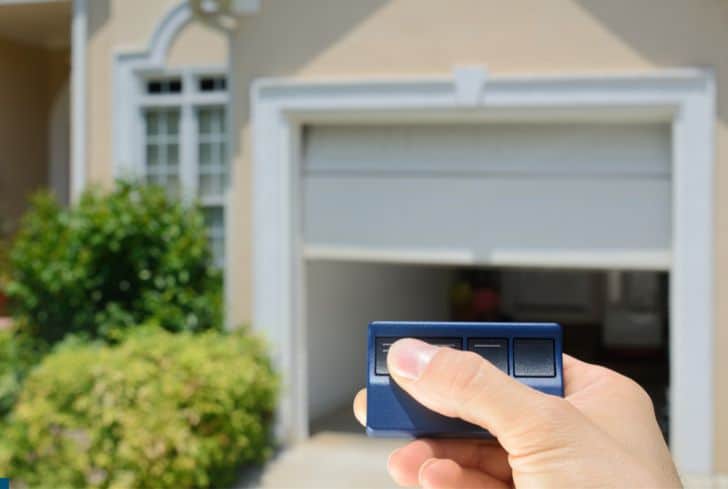Welcome to the modern world of garage door openers! You drive in from work, and as you approach your garage door, it starts to open. You didn’t even have to get out of your car! You park inside, and the door closes automatically behind you. We all love this level of convenience, right? But just how many amps does a garage door opener use?
Well, garage door openers don’t all use the same amount of power. It really depends on the model and type of opener you have. Even so, most units draw between 2 and 5 amps of power at 120V when idle, and about 12 amps when the door is in operation. It could be more or less than that, depending on the specs of the specific opener.
Read: How Many Amps Does a LED Light Bulb Draw?
It’s not something most people think about, but knowing the amperage draw of your car garage door opener can be important. And in this blog post, I have put together everything you need to know about the power usage of garage door openers.
Expect to know the amount of electricity they use, the ideal breaker size, how to maintain one, and so much more. But as usual, let’s begin with a bit of background information.
How Do Garage Door Openers Work?
Garage door openers work by using a system of springs, pulleys, and cables to open and close your garage door. The opener itself is mounted on the ceiling of your garage, and it consists of a motor, chain, belt, or screw that drives the mechanism.
When you press the button on your garage door opener remote, it sends a signal to the opener unit. The opener unit then activates the motor, turning the chain or belt. This action causes the door to open or close.
The chain or belt is connected to a series of pulleys mounted on the garage door tracks. As the chain or belt moves, the pulleys move as well. This action opens or closes the garage door by moving the door along the tracks.
How Many Watts Does a Garage Door Opener Pull?
A garage door opener draws about 350 to 600 watts of power, with 500 watts serving as the average wattage when the unit is idle. So, when the lighting is on and the door is in operation, the wattage requirements increase depending on the garage door opener and lighting type.
You see, in the same way wattage ratings in other appliances differ from one model to another, so is with the garage door opener. And usually, this power demand falls under 600 watts when the unit is idle.
But once the unit’s control board activates the door and sets it in operation, the wattage requirements go as high as 1,400 watts but settles to between 550 and 725 once the door is in motion. The actual energy requirement depends on the type of the door.
Of course, that’s without bringing in the lighting. But as for the lamps, they may not make a significant difference, especially if you’re using the energy-saving LEDs.
How Many Amps Does My Garage Door Opener Use?
The actual amperage of your garage door opener depends on its actual wattage. However, going by the average idle wattage range of 350 to 600 watts, you can expect your garage door opener to draw anywhere between 2.92 amps and 5 amps, with the average being 4.17 amps at 120 volts.
You see, the garage opener isn’t a very demanding appliance. Actually, you’ll notice that it doesn’t require as much electricity as some of the other household appliances. Nevertheless, it’s always a good idea to know the exact amps it needs, as it will help you in electrical configuration.
And on average, a garage door opener needs about 4.17 amps, which is still within the 5 amps, although that can go up to about 12 amps when the door is in operation. Nevertheless, the actual amperage will still depend on the model and make of your garage door opener.
Does a Garage Door Opener Need a Dedicated Circuit Breaker?
A garage door doesn’t need a dedicated circuit breaker, although it’s better to have one. A dedicated circuit breaker will bring in a lot of conveniences and even help you beef up the security of your garage.
You see, a garage door opener isn’t a power guzzler. So, unlike some home appliances, you don’t need to worry about overloading your circuits. Nevertheless, having a dedicated circuit breaker for your garage door opener is still a good idea.
A dedicated circuit breaker will help you in two ways. First, it will allow you to easily switch off your garage circuit breaker whenever you leave home. That’s a great way to ensure that no one can access your garage – whether it’s from outside or even remotely.
Second, a dedicated circuit breaker will make it easier for you to identify and solve any problems with the circuit. So, if you’re ever facing any issues with your garage door opener, a dedicated circuit breaker will help you narrow down the problem and find a solution quickly.
In short, a garage door opener doesn’t need a dedicated circuit breaker, but having one is worth it. It will help you in terms of convenience and security.

What Breaker Size Should You Use For Your Garage Door Opener?
Your garage door opener should be on a 120-volt 20-amp circuit breaker, the same as the laundry, bathroom, and kitchen. That’s according to the code requirement passed in 2017 by the National Electrical Code (NEC).
Perhaps you’re wondering, “Can’t a 15-amp breaker suffice for a garage door opener?” Technically, yes. After all, garage doors don’t need plenty of power like some appliances in your home. It’s even served for years as the most popular option for garages before the new code section was added.
Read: How Many Amps Does an Electric Oven Use?
However, we recommend that you go with the 20-amp breaker to be on the safe side. You’ll find the larger size to be safer and more convenient, especially if you have several garage door openers that have to be on the same circuit.
The 20-amp breaker can support up to 3 or 4 garage doors at once. But that’s not the maximum number of doors that can be on the same circuit. As long as they don’t all try to open simultaneously, you can have more doors wired into the one circuit.
As for the lights in your garage, it’s ideal if they’re on a separate circuit from the garage door opener.
What is Ground-Fault Circuit-Interrupters or GFCI & Should I Use GFCI in My Garage?
A Ground-Fault Circuit Interrupter (GFCI) is an outlet that has a built-in circuit breaker. It’s designed to protect people from electrical shocks by shutting off the power when it detects a current leak.
GFCIs are highly recommended in places where water contact is likely, and that includes the kitchen, laundry, and bathroom. But then again, having a GFCI protection in your garage is not a bad idea either.
Even though the outlets in your garage are 8 to 12 feet off the ground (so water exposure is unlikely), they’re still wired into other garage outlets. So if there’s ever a current leak, the GFCI will shut off the power and prevent electrical shocks.
To sum it up, you don’t necessarily need a GFCI outlet in your garage. But it’s still a good idea to have one, just to be on the safe side. And as usual, find a qualified electrician to help you with the installation. It’s one of the most sensitive parts of your electrical system, and you don’t want to mess it up.
Is It Necessary To Install a Battery Backup For Your Garage Door Opener?
Yes, having a battery backup for your garage door is a necessary installation. A battery backup will ensure that your garage door opener will continue functioning even during a power outage. It lets you enjoy all the convenience and safety a garage door opener provides without ever getting stranded outside your garage.
Sometimes our homes are without power for hours or even days. During these times, a garage door opener with a battery backup is essential. Not only will it let you in and out of your garage, but it will also allow you to operate your garage door opener remotely.
And actually, if you live in some states like California, installing a battery backup for your garage opener is now a requirement by law. The bill was passed in the fall of 2018, requiring all new garage door openers to have a battery backup as a safety measure.
According to the new bill, B969, all garage door openers manufactured, sold, or replaced after July 1, 2019, must have a battery backup system. According to the bill, manufacturing, selling, or installing a garage door opener without a battery backup attracts a penalty of $1000.
Read: How Many Amps Does a Phone Charger Use?
Frequently Asked Questions (FAQ’S)
How Much Does It Cost To Install a Garage Door Opener?
The cost of installing a garage door opener differs depending on the location and the expert you hire. But on average, you can expect to spend between $120 and $550 for professional installation. The installation takes about 2 to 6 hours, costing an average rate of $60 to $85 per hour. As for the unit cost, it’s between $200 and $550, depending on model and features.
How Much Does It Cost To Maintain a Garage Door Opener?
The labor cost of maintaining a garage door opener is about $130. As for repairing a door opener, it may need about $300, depending on the nature of the issue. Maintenance work includes tightening hardware, oiling any chains, or greasing any rails, depending on the type of garage door you have. You can do it as long as you have the necessary tools and knowledge.
What is the Lifespan of a Garage Door Opener?
The lifespan of a garage door opener is 10-15 years on average. But with proper maintenance, it can last even longer. Actually, if you’re careful enough with its use and you regularly maintain it, your opener can last for 20 years or more.
Final Verdict
A car garage door opener is a great convenience to have in your home. It provides safety and security while also making your life more convenient. But like all electric appliances, it relies on electrical energy to function. And thankfully, it doesn’t have as much power consumption as some home appliances. So, it just isn’t among the units that will significantly shift your power bill.






